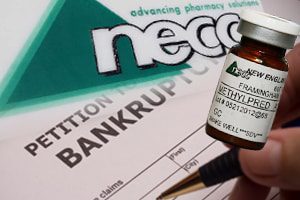
The New England Compounding Center (NECC), the Framingham, Massachusetts pharmacy linked to the deadly, ongoing fungal meningitis outbreak, has filed for bankruptcy. NECC has been blamed, to date, for 620 infections and 39 deaths, according to NBC News. Infections, which initially involved fungal meningitis, now include other, dangerous infections. NECC filed for Chapter 11 bankruptcy […]
 The New England Compounding Center (NECC), the Framingham, Massachusetts pharmacy linked to the deadly, ongoing fungal meningitis outbreak, has filed for bankruptcy.
The New England Compounding Center (NECC), the Framingham, Massachusetts pharmacy linked to the deadly, ongoing fungal meningitis outbreak, has filed for bankruptcy.
NECC has been blamed, to date, for 620 infections and 39 deaths, according to NBC News. Infections, which initially involved fungal meningitis, now include other, dangerous infections. NECC filed for Chapter 11 bankruptcy protection Friday in the Massachusetts district bankruptcy court; said NBC News. The firm pledged to establish a victims’ compensation fund; however, at least one attorney has pointed out that this fund is no promise of justice to victims and is required in this type of filing.
In a statement issued by NECC, it said that the goal of the bankruptcy filing is to provide a “greater, quicker, fairer payout” to creditors than would otherwise be achieved through what it described as “piecemeal” litigation.
As we’ve mentioned, the NECC mixed at least 14,000 vials of methylprednisolone acetate and shipped the drugs to more than 70 pain management and other health care clinics in 23 states. Testing on sample vials showed that many were contaminated with a fungus responsible for the outbreak of the deadly form of meningitis.
The outbreak appears to have begun in late September when physicians in Tennessee were treating a man with an unusual form of meningitis that did not appear to have a bacterial or viral cause. Evidence of fungal infection was detected and involved the mold, Aspergillus fumigatus. The physicians advised the state’s public health authorities and, soon, injections of a steroid, methylprednisolone acetate, were linked to this first case and to other, subsequent cases. The tainted steroid was injected into patients’ spines or joints for chronic back pain.
NECC was later discovered to be tainted with a fungus that was not Aspergillus; a black mold, Exserohilum rostratum, is believed to be the culprit in the outbreak. That mold is one of several organisms that only rarely cause human disease and has been discovered in some vials containing the steroid and in several of those sickened.
We recently wrote that, while hundreds have been sickened with fungal meningitis following injections with tainted NECC steroids, a new trend is being seen in connection with the drugs. This second wave of fungal infections has been diagnosed in dozens of patients and includes symptoms such as excruciating abscesses or inflamed back nerves. The infections have been difficult to cure, noted The Boston Globe. And, because the infections mimic patients’ original back pain, many might be unaware that they are suffering from a spinal infection, according to a health alert issued by the federal Centers for Disease Control and Prevention (CDC).
Of those who received steroids laced with black mold from NECC many of those who survived but were sickened, have relapsed and have been hospitalized several times, with most suffering devastating treatment side effects, including hallucinations, serious kidney damage, trouble concentrating, upset stomach, swollen feet and ankles, and hand tremors, said the Globe. Released patients must undergo regular blood testing; electrocardiograms; MRIs; and spinal taps, which are known to be painful. Treated patients likely need medication anywhere from three to 12 months, but physicians remain unclear as to treatment times and are unsure if the fungus will ever be fully eradicated from patients’ bodies, according to patients, lawyers, and infectious disease specialists interviewed by The Globe.
NECC also announced the appointment of Keith D. Lowey as its independent director and chief restructuring officer. Lowey will supervise NECC restructuring and its effort to create a compensation fund. According to a statement issued by Daniel Cohn, NECC’s bankruptcy counsel, claimants and their lawyers will be “actively involved” in the compensation process, said NBC News. “Many families across the U.S. have been impacted by this great tragedy, and it is difficult to comprehend the sense of loss so many people have experienced,” Lowey said in a statement. “Everyone associated with the New England Compounding Center shares that sense of loss,” he added.


